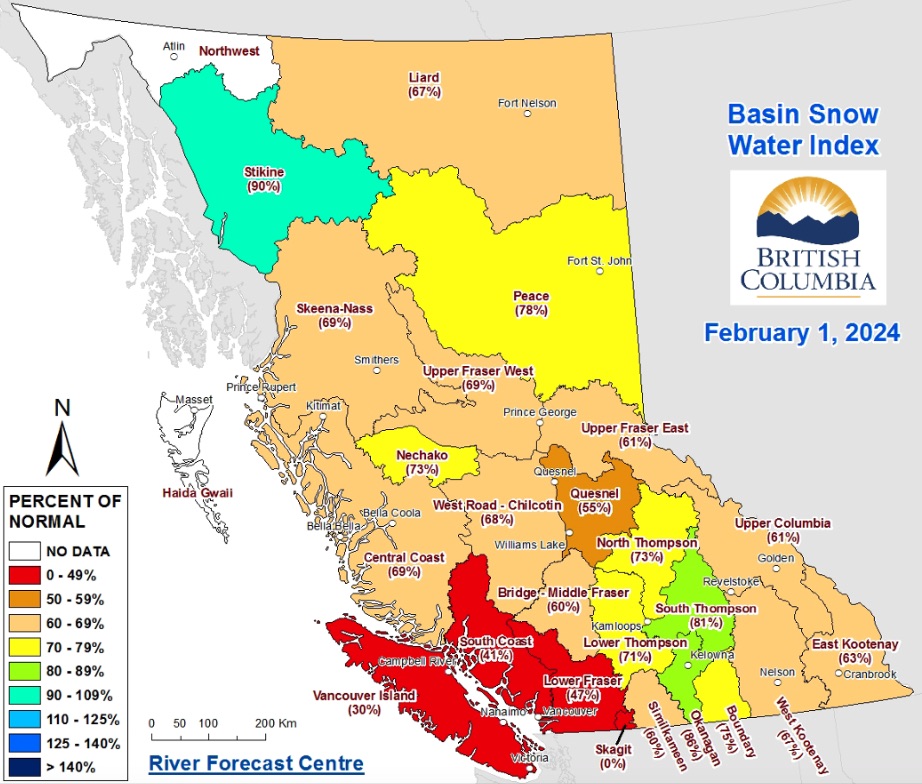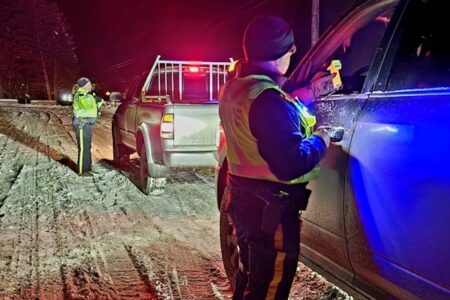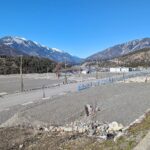Low snowpack means drought concerns; action urged to safeguard freshwater
Columbia Basin, BC – Concerns regarding the impacts of record-low snowpacks on B.C.’s freshwater supplies are mounting following the release of the provincial government’s most recent snow survey report.
According to the BC River Forecast Centre’s snow survey as of February 1, the province-wide snowpack remains very low, averaging 39% below normal (compared to 21% this time last year). In the B.C. Columbia Basin, average snowpack in the Upper Columbia, West Kootenay and East Kootenay regions is sitting at 30%, 33% and 37% below normal respectively, and current trends in low snowpack are expected to persist. The likelihood of experiencing another record drought this summer is significant.
Snowpack serves as a natural reservoir, gradually releasing water during the spring snowmelt. Meltwater recharges rivers, streams, wetlands, lakes and groundwater. Reduced snowpack levels pose a threat to the availability of freshwater critical for agriculture, community water systems, and ecosystem health.
In the Kootenay region, where Living Lakes Canada is based, the record wildfire and drought of 2023 had devastating consequences including home losses, damaged municipal water supply structures, increased water restrictions, drops in aquifer levels, low flows in rivers and streams, and wetlands and lakes drying out. To better understand the impacts of climate change on water availability, Living Lakes Canada has been implementing a coordinated monitoring network across the region. Data is already being used to support community climate adaptation planning, assess wildfire impacts on water quality, inform restoration projects and regional model validation, and guide sustainable water usage.
“The low snowpack being recorded across the Columbia Basin has concerning implications for water supply throughout the rest of 2024,” said Paige Thurston, Columbia Basin Water Monitoring Framework Program Manager with Living Lakes Canada. “Unless conditions shift in the next few months, communities should be prepared for low stream flows this summer. It will be critical that we track water and climate conditions throughout the year and respond accordingly.”
“As a member of the BC Watershed Security Coalition, Living Lakes Canada joins numerous other organizations across the province calling for strong, decisive action by the B.C. Government in response to severe drought conditions experienced in 2023 and beginning now for 2024,” said Living Lakes Canada Executive Director Kat Hartwig. “We continue to work with all levels of government to safeguard water. Unfortunately, the impacts of climate change on water security were forecast by scientists decades ago when we had the opportunity to plan ahead, instead of being immersed in a costly, reactionary cycle, trying to address the current reality of flood, drought, fires, repeat. At this stage, it is essential to rapidly generate collaborative problem-solving approaches both provincially and at the local scale where the impacts occur.”
The BC Watershed Security Coalition is calling for the provincial government to create a Watershed Management System across B.C. and invest $75 million annually into the province’s Watershed Security Fund to safeguard freshwater for current and future generations. A historical investment like this would provide the necessary long-term support for climate adaptation projects already taking place across the province, and accelerate Provincial drought response.
To read the full bulletin, visit: https://www2.gov.bc.ca/gov/
[Media release from Living Lakes Canada ]

























